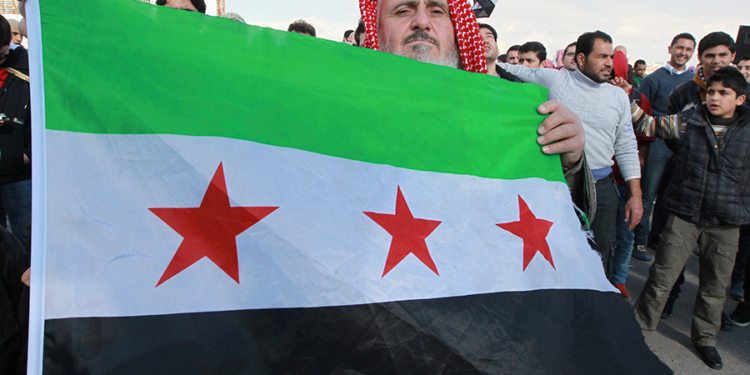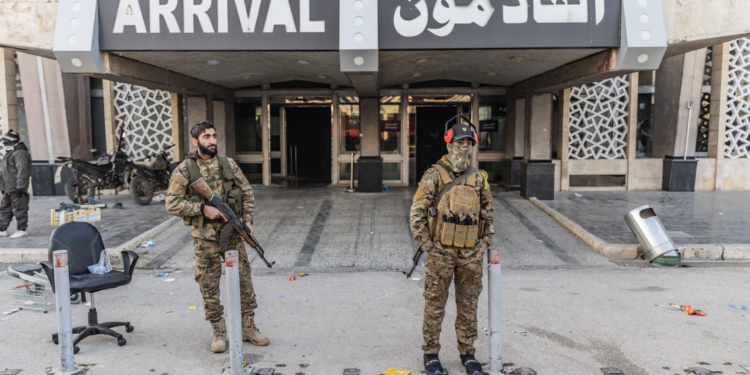Editor’s Note: From his base in Georgia, academic Emil Avdaliani follows regional security and economic trends and contributes frequently to Stimson on these topics. He is particularly expert on the issue of regional ties with Russia and China.
By Barbara Slavin, Distinguished Fellow, Middle East Perspectives
As Russia’s relations with Iran have expanded over the past few years, Moscow has grown increasingly connected with the “Axis of Resistance,” the sprawling network of militias backed by the Islamic Republic across the Middle East.
One example is the growing cooperation between Russia and Ansar Allah (commonly known as the Houthis), a Shi’ite sect from northern Yemen that has taken control over the most populous parts of the country since 2014 and that for the past year has menaced shipping in the Red Sea in a show of solidarity with another Iran-backed militant group, Hamas.
Since the outbreak and spread of the Gaza war, following Hamas’s attack on Israel on Oct. 7, 2023, Russia has hosted several Houthi delegations, provided diplomatic cover for the group at the United Nations, and reportedly given tracking data to the Houthis to allow them to better target commercial shipping in the Red Sea.
There are also reports that Russia plans to give arms supplies such as AK-74s and anti-ship Yakhont missiles to the Yemeni militia. Moreover, military advisors from Russia’s foreign military intelligence agency, the GRU, are reportedly present in Houthi-held territory.
On the political level, Russian Deputy Foreign Minister Mikhail Bogdanov has held several meetings with Houthi representatives. The Houthis responded by affirming the Feb. 21, 2022 “independence” declarations of the Russian-occupied Ukrainian regions of Donetsk and Luhansk – declarations issued just prior to Russia’s full-scale invasion of Ukraine. In addition, there have been recent allegations that Houthis have been pressed into fighting in Ukraine as part of a trafficking operation that lured the Yemeni fighters with promises of well-paid jobs and Russian citizenship.
The Russia-Houthi rapprochement is a break from Moscow’s initial neutrality in the Yemen civil war that broke out in the 2010s. Russia still technically recognizes the internationally accepted government of Yemen, based in the southern city of Aden. But that hedging approach has given way to more active engagement with the Houthis as Moscow sees new opportunities in the Arabian Peninsula to compete with the West and divert attention from Ukraine. The Kremlin is signaling that it can reach any geography to hurt the West and punish it for opposing Russia’s territorial ambitions in Ukraine.
Beyond the anti-Western dimension, Moscow seems to have inserted itself in Yemen as a way to gain leverage over Saudi Arabia amid its negotiations with the U.S. over a possible defense treaty. This thinking is particularly relevant in anticipation of the second Trump administration when Riyadh could opt for a more pro-American stance in managing oil prices. In return, Trump might seek to curtail growing Saudi ties to Russia.
The expansion of ties between Russia and the Houthis also coincides with shifts within the Axis of Resistance that have severely weakened Hamas and Hezbollah, historically, two much more central players in the confrontation with Israel. The Houthis, although extremely far from Israel/Palestine, have attained a greater role within the Axis through their calibrated attacks on international shipping. The goal to pressure Israel to end the war in Gaza catapulted the Houthis into an important player in the shifting power balance in the Middle East.
For the Houthis, closer ties with Moscow conveys greater prestige in international arena. Ties with Russia connote international recognition and more importantly, open up additional sources of military and intelligence support beyond what Iran can provide.
For Russia, expanded ties with Hezbollah, Hamas as well as the Houthis are a step toward the formation of a more multipolar international system.
But Moscow also recognizes the potential downsides of growing cooperation with such non-state actors. Russia does not want to alienate Saudi Arabia and the United Arab Emirates, which engaged in a bloody conflict with the Houthis in Yemen from 2016-2022. Moscow has grown increasingly close to Riyadh and Abu Dhabi in the aftermath of the Ukraine invasion. The two Arab countries, in turn, see Russia’s shift away from the European Union toward Asia and the Middle East as highly beneficial to their strategic vision of foreign policy diversification.
Given the transactional nature of Russia’s policy toward the Middle East, its leadership is unlikely to risk expanding ties with the wealthy Persian Gulf states. This may explain why Moscow so far has sent only a small batch of arms to the Houthis.
At the same time, if Russia sees added value to the Yemeni militia as a disruptor of Western influence in the Middle East and more importantly, a diverter of Western military aid from Ukraine, some in the Kremlin could calculate that it is worth antagonizing Saudi Arabia and the UAE. Russia could also supply arms to Yemen indirectly via Iran or seek assurances from the Houthis that they will not use Russian weapons against their Arab neighbors.
Russia is also not willing to completely downgrade its relations with Israel. Moscow and Tel Aviv have long enjoyed special if non-allied ties that have allowed Israel free reign to attack Iranian and Hezbollah targets in Syria. In return, Israel has had a muted position on the war in Ukraine.
Overall, Russia’s posture in the Middle East is opportunistic. While shying away from deep military engagement, it facilitates the Houthis’ efforts to play a role in the region’s seminal conflict and furthers Russia’s own territorial ambitions.
Emil Avdaliani is a professor of international relations at European University in Tbilisi, Georgia, and a scholar of silk roads. He can be reached on X at @emilavdaliani.
Editor’s Note: From his base in Georgia, academic Emil Avdaliani follows regional security and economic trends and contributes frequently to Stimson on these topics. He is particularly expert on the issue of regional ties with Russia and China.
By Barbara Slavin, Distinguished Fellow, Middle East Perspectives
As Russia’s relations with Iran have expanded over the past few years, Moscow has grown increasingly connected with the “Axis of Resistance,” the sprawling network of militias backed by the Islamic Republic across the Middle East.
One example is the growing cooperation between Russia and Ansar Allah (commonly known as the Houthis), a Shi’ite sect from northern Yemen that has taken control over the most populous parts of the country since 2014 and that for the past year has menaced shipping in the Red Sea in a show of solidarity with another Iran-backed militant group, Hamas.
Since the outbreak and spread of the Gaza war, following Hamas’s attack on Israel on Oct. 7, 2023, Russia has hosted several Houthi delegations, provided diplomatic cover for the group at the United Nations, and reportedly given tracking data to the Houthis to allow them to better target commercial shipping in the Red Sea.
There are also reports that Russia plans to give arms supplies such as AK-74s and anti-ship Yakhont missiles to the Yemeni militia. Moreover, military advisors from Russia’s foreign military intelligence agency, the GRU, are reportedly present in Houthi-held territory.
On the political level, Russian Deputy Foreign Minister Mikhail Bogdanov has held several meetings with Houthi representatives. The Houthis responded by affirming the Feb. 21, 2022 “independence” declarations of the Russian-occupied Ukrainian regions of Donetsk and Luhansk – declarations issued just prior to Russia’s full-scale invasion of Ukraine. In addition, there have been recent allegations that Houthis have been pressed into fighting in Ukraine as part of a trafficking operation that lured the Yemeni fighters with promises of well-paid jobs and Russian citizenship.
The Russia-Houthi rapprochement is a break from Moscow’s initial neutrality in the Yemen civil war that broke out in the 2010s. Russia still technically recognizes the internationally accepted government of Yemen, based in the southern city of Aden. But that hedging approach has given way to more active engagement with the Houthis as Moscow sees new opportunities in the Arabian Peninsula to compete with the West and divert attention from Ukraine. The Kremlin is signaling that it can reach any geography to hurt the West and punish it for opposing Russia’s territorial ambitions in Ukraine.
Beyond the anti-Western dimension, Moscow seems to have inserted itself in Yemen as a way to gain leverage over Saudi Arabia amid its negotiations with the U.S. over a possible defense treaty. This thinking is particularly relevant in anticipation of the second Trump administration when Riyadh could opt for a more pro-American stance in managing oil prices. In return, Trump might seek to curtail growing Saudi ties to Russia.
The expansion of ties between Russia and the Houthis also coincides with shifts within the Axis of Resistance that have severely weakened Hamas and Hezbollah, historically, two much more central players in the confrontation with Israel. The Houthis, although extremely far from Israel/Palestine, have attained a greater role within the Axis through their calibrated attacks on international shipping. The goal to pressure Israel to end the war in Gaza catapulted the Houthis into an important player in the shifting power balance in the Middle East.
For the Houthis, closer ties with Moscow conveys greater prestige in international arena. Ties with Russia connote international recognition and more importantly, open up additional sources of military and intelligence support beyond what Iran can provide.
For Russia, expanded ties with Hezbollah, Hamas as well as the Houthis are a step toward the formation of a more multipolar international system.
But Moscow also recognizes the potential downsides of growing cooperation with such non-state actors. Russia does not want to alienate Saudi Arabia and the United Arab Emirates, which engaged in a bloody conflict with the Houthis in Yemen from 2016-2022. Moscow has grown increasingly close to Riyadh and Abu Dhabi in the aftermath of the Ukraine invasion. The two Arab countries, in turn, see Russia’s shift away from the European Union toward Asia and the Middle East as highly beneficial to their strategic vision of foreign policy diversification.
Given the transactional nature of Russia’s policy toward the Middle East, its leadership is unlikely to risk expanding ties with the wealthy Persian Gulf states. This may explain why Moscow so far has sent only a small batch of arms to the Houthis.
At the same time, if Russia sees added value to the Yemeni militia as a disruptor of Western influence in the Middle East and more importantly, a diverter of Western military aid from Ukraine, some in the Kremlin could calculate that it is worth antagonizing Saudi Arabia and the UAE. Russia could also supply arms to Yemen indirectly via Iran or seek assurances from the Houthis that they will not use Russian weapons against their Arab neighbors.
Russia is also not willing to completely downgrade its relations with Israel. Moscow and Tel Aviv have long enjoyed special if non-allied ties that have allowed Israel free reign to attack Iranian and Hezbollah targets in Syria. In return, Israel has had a muted position on the war in Ukraine.
Overall, Russia’s posture in the Middle East is opportunistic. While shying away from deep military engagement, it facilitates the Houthis’ efforts to play a role in the region’s seminal conflict and furthers Russia’s own territorial ambitions.
Emil Avdaliani is a professor of international relations at European University in Tbilisi, Georgia, and a scholar of silk roads. He can be reached on X at @emilavdaliani.



































